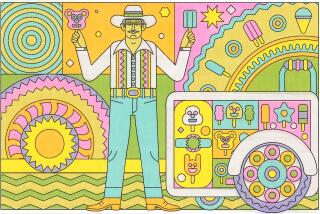Chip Off the Old Block : Warm-Hearted Ice Man Melts Stereotypes
- Share via
ARTESIA — The ice plant owner, in his everyday attire of jeans, cowboy boots and Harley-Davidson T-shirt, drove the forklift around a storage room so cold his breath came out as white as his hair and beard.
He stacked bags of crushed ice while his workers, bundled up in jackets and hoods against the 24-degree air, pushed 300-pound blocks of ice onto the dock and into a truck.
“It’s a hands-on type deal, you’ve got to be able to work on everything and fix everything yourself,” said Bill Frampton. He has owned Artesia Ice Service for 16 years, but it is his hair, clothes and the motorcycle he drives to work that make him a recognizable character.
No one could believe it when he showed up in a suit and tie to be honored as the Artesia Chamber of Commerce’s 1992 member of the year.
“Am I a character, Linda?” he asked his secretary, Linda Fife, in his office the other day, and they both laughed. Appearances aside, Frampton is known as a straightforward, hard-working businessman who has thrived in an era that has seen most of the old ice plants disappear.
“I have enough common sense to make the right moves once in awhile,” Frampton said. “We’ve been here 64 years--that can’t be luck.”
“He never runs out of energy--he’s 52 going on 16,” said his wife, Laura Frampton, who handles the books at the ice plant, one of the city’s oldest businesses. Her husband has run the plant for 16 years, and before that, his father, Harvey Frampton, ran it.
If the ice man isn’t on the forklift, he might be out making deliveries, or backing a tractor-trailer against the dock, or checking on the tanks, compressors, crushers and ice-cube-making machines in the rear of the ammonia-scented building. There is a slim chance he might be at his desk.
“What’s funny,” Frampton said, “is we’ll be working and somebody will walk up and say to me, ‘Is the owner here?’ and I’ll say, ‘No, I don’t think so, but check in the office.’ ”
Frampton has a biker’s aura, but he is as mellow as Buster, the ice plant dog.
“He’s known as a rough, tough guy, but he has such a big heart,” said Larry Ward, a member of the Bellflower school board and a longtime friend.
“He does so much for people, helping friends, all on the condition no one will know where it came from. Some might think he’s bold, but he’s so bashful.”
At Christmas, Frampton takes his snow-making truck into neighborhoods where youngsters never get to go to the mountains. “They go nuts, they absolutely love it,” he said. “You’ve got to hold them back till we get it down.”
The walls in the ice plant office bear plaques that praise Frampton’s donations of ice for events in Artesia and in Cypress, where he lives, but they are dominated by photos of trucks and scantily attired women sitting on motorcycles. “Girlie posters,” said Laura, who said she isn’t worried. “It doesn’t bother me. I like to look at men. We have a secure relationship.”
Easy Rider magazine is on a table, near the latest copy of Refrigerated Transporter. Frampton also owns a trucking company in Visalia and has a fleet of seven refrigerated tractor-trailers.
*
The ice business, Frampton said, “is a fairly simple deal, that’s why I guess I can keep doing it. Like I tell everybody, we lost the recipe once, but we keep going.”
The company’s been going since the days when its men delivered big blocks to households so the food in the icebox wouldn’t spoil.
“Today all your ice is basically recreational,” Frampton said. “I pretty much stay on the wholesale side. We still make a 300-pound block of ice, and there are only about three plants left that do that in Southern California. We wholesale them (from $10 to $30 a block) to other ice men, and they cut them up in smaller blocks or crush them up for bags.”
Frampton also sells ice to produce houses, restaurants, liquor stores, hotels, hospitals, colleges, supermarkets and ice-carving firms. He even hauls it to mountain fish hatcheries so that trout can enjoy cold water while they are trucked to lakes. The fish require water without chlorine, and most ice plants use chlorinated city water, he said. The water that Frampton freezes is purified after being pumped from an artesian well behind the plant.
Anyone can still come to the plant’s docks and get ice out of a vending machine. But few people do anymore.
“Ten years ago on Friday or Saturday night the cars would be lined up on the street,” Frampton said. “It was like the ice man was the only place to get ice. Now every liquor store has got an ice machine.”
*
Frampton’s roots go back to one of Artesia’s founding families. His great uncle, George Frampton, graduated in 1890 from the city’s first school.
“Hell,” the ice man said, “at one time (Framptons) owned most of the land around here. They did a major part of the farming and were in the dairy industry. They owned a bank and a couple of stores. Then they lost it all in the Depression.”
His father, who had been laid off in the oil fields, was hired at the ice plant when it opened in 1929. It was not long before he was put in charge, and he ran the plant for years. He ended up buying it in the late 1960s.
The plant was on Pioneer Boulevard then, a block or so from where it is now. It occupied a brick building, long since demolished, that also housed a hardware store, frozen food lockers and a beauty shop.
Now almost hidden, the plant, still with some of the original machinery, is in a nondescript building off Clarkdale Avenue and runs along what used to be a dirt alley. A few years ago it was paved and named Frampton Court.
Bill Frampton grew up around the old plant, and started selling ice off the docks when he was 9. When he was 12, he was getting 50 cents an hour. He worked there through his years at Excelsior High School, ran with a tough crowd and was known as a fun-loving prankster, which did not please his strict father.
“We’d get our work done first, then we’d goof off,” Frampton recalled. One day he aimed a can of brine water at a buddy, but the plant’s landlord, who unexpectedly had come walking by in his business suit, got it instead.
He worked at the plant until he was in his early 20s. Then, after driving trucks for six years, he came back in the mid-1960s to fix the machines, sell and deliver the ice. “I finally had matured and got smarter and realized my best future was right here,” said Frampton, who became the owner shortly before his father died in 1978.
*
The ice company does almost 70% of its business in the summer, when 720 huge blocks and 15 tons of ice cubes are made every 24 hours, when 25 workers--three times as many as in the winter--scurry around with tongs and hoses, and when the electricity bill soars to $25,000 a month.
“When you get into 100 degrees, that’s when it’s really great,” Frampton said. “There’s not enough ice in Southern California when it gets into the 90s and 100s.”
Many ice plants have vanished, Frampton said, because owners “didn’t realize that the money they make in the summer had to take them through the whole year. You have to put it in the bank, and make sure it’s available in the winter to pay bills when no money is coming in.”
When he had finished working in the cold storage room on that morning last week, the ice man stepped out into the warmth of Frampton Court. He thought of what he has accomplished with only a high school education, and he thought of his father.
“I’m extremely proud we’ve been in business 64 years,” he said. “Not a lot of people can say that. That says a lot for my dad and myself and for stick-to-it-iveness.”
He put on sunglasses, climbed on his Harley and said to Laura, “Honeycakes, get on.”
He revved the engine, which excited Buster, who had been napping in the sun. The dog gathered around the motorcycle, as happy as its masters, and the three of them seemed frozen in time.
More to Read
Inside the business of entertainment
The Wide Shot brings you news, analysis and insights on everything from streaming wars to production — and what it all means for the future.
You may occasionally receive promotional content from the Los Angeles Times.










